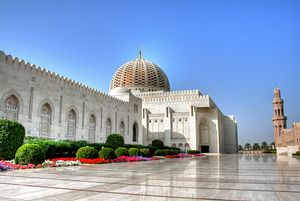Despite the lack of coverage, Indonesia and Oman have become indispensable partners. Their partnership has witnessed a series of quiet, yet important, developments in recent years.
Although the ties between Indonesia and Oman can be traced back to the 13th century when Omani traders began to traveling in the Eastern hemisphere, formal bilateral ties between the two countries began in 1978. Since then, Jakarta and Muscat have witnessed remarkable developments in their cooperation with reciprocal visits conducted by officials of the two countries.
It cannot be denied that trade is at the heart of their growing partnership. It was reported late last year that the total two-way trade between the two countries has reached almost $600 million. Indonesia’s total non-energy exports to Oman amounted to $193.92 million, a 2.36 percent increase from the previous year. These exports include wood, furniture, electrical appliances, paper, textiles, and food. Meanwhile, Indonesia’s imports from Oman increased from $226.18 million in 2012 to $462.34 million in 2013 and consist of mineral fuels, inorganic chemicals, and mining products.
The oil business has also been at the center of Jakarta-Muscat relations. Even though Oman is a modest oil producer in comparison to other GCC countries, Indonesia’s increasing energy needs are raising the profile and significance of all energy exporters, including smaller producers such as Oman. In recent years, there have been a number of energy exploration and production agreements between the two countries. PT Medco Energy International, for example, has been operating its wholly-owned subsidiary Medco Oman LLC, which possesses a 55 percent participating interest in Karim Small Fields. Given that its own energy reserves are being quickly depleted, Indonesia’s reliance on the Gulf’s energy is expected to increase in the coming years. This may be the main reason why efforts have been exerted by several energy firms to expand their operations in Oman. It was reported last year that Medco is planning to acquire assets in Oman. At the same time, Indonesia’s national petroleum firm Pertamina was in negotiations with the Omani government for the takeover of petroleum and natural gas assets in the Gulf.
Seeing mutual benefits emanating from their growing partnership, the Indonesian government established a diplomatic representative office in 2010. At the same time, recognizing the importance of air connectivity, Oman Air has also began direct flights between Jakarta and Muscat. This initiative could contribute to deeper contact among diplomats, investors, and businessmen.
Other strategies have been employed in order to increase investments and joint projects between the countries. The Oman Chamber of Commerce and Industry and the Indonesian Chamber of Commerce and Industry have signed a Memorandum of Understanding, which aims to explore investment opportunities and to increase the trade volume between the two countries. Several conferences and meetings have also been held to increase contact between Jakarta and Muscat. Last year, for example, the Indonesia-Oman Business Forum was held in Oman and was attended by 20 Omani representatives and more than 50 delegates from Indonesian companies, industries, and institutions.
It is predicted that the Indonesian-Oman partnership may expand into different fields, including infrastructure. As Oman is expected to continue its development and infrastructure projects, Indonesia is planning to increase its exports of construction and development materials. At the same time, Jakarta also aims to participate in the Gulf’s massive railway project, connecting the Omani city of Sohar to the UAE and later to Saudi Arabia. This indicates that the number of construction companies and workers from Indonesia will likely to increase in the coming years. Currently, there are approximately 30 thousands migrant workers from Indonesia in Oman.
Cooperation between Oman and Indonesia is expected to continue flourishing in the coming years. During the visit of Omani representatives to Jakarta late last year, the director general of Indonesia National Export Development Agency (BPEN) declared that Jakarta is aiming to strengthen its foothold in Oman’s fast-growing markets. Indonesia has, in recent years, been probing to expand its consumer markets against the danger of potential economic tumult in Europe and America, and Oman not only provides Indonesia a road to access untapped export markets and worthwhile investment opportunities, but also offers the possibility to actually serve as a hub for economic expansion in the Gulf and the wider Middle East. Although it is Southeast Asia’s largest economy, Indonesia still needs to attract billions of dollars in investments to improve its fledging economy, boost growth, and slash unemployment, which is currently around 6.3 percent.
As for Oman, given Indonesia’s status as one of the largest economies in South East Asia and a G20 member, it is seen as a promising target for investments. Additionally, with a population of over 250 million people, Indonesia is a very attractive consumer market for Oman. Indonesia’s strategic position – that is, its proximity to Australia and its location in Southeast Asia – would help enhance Oman’s presence in the growing Southeast Asia and even Australia. While the situation in the Middle East region is often unstable, moving towards the East would be a reasonable move.
Muhammad Zulfikar Rakhmat has lived in the Middle East for seven years. He holds a B.A. in International Affairs from Qatar University and is currently pursuing an M.A. in International Politics at the University of Manchester.
































